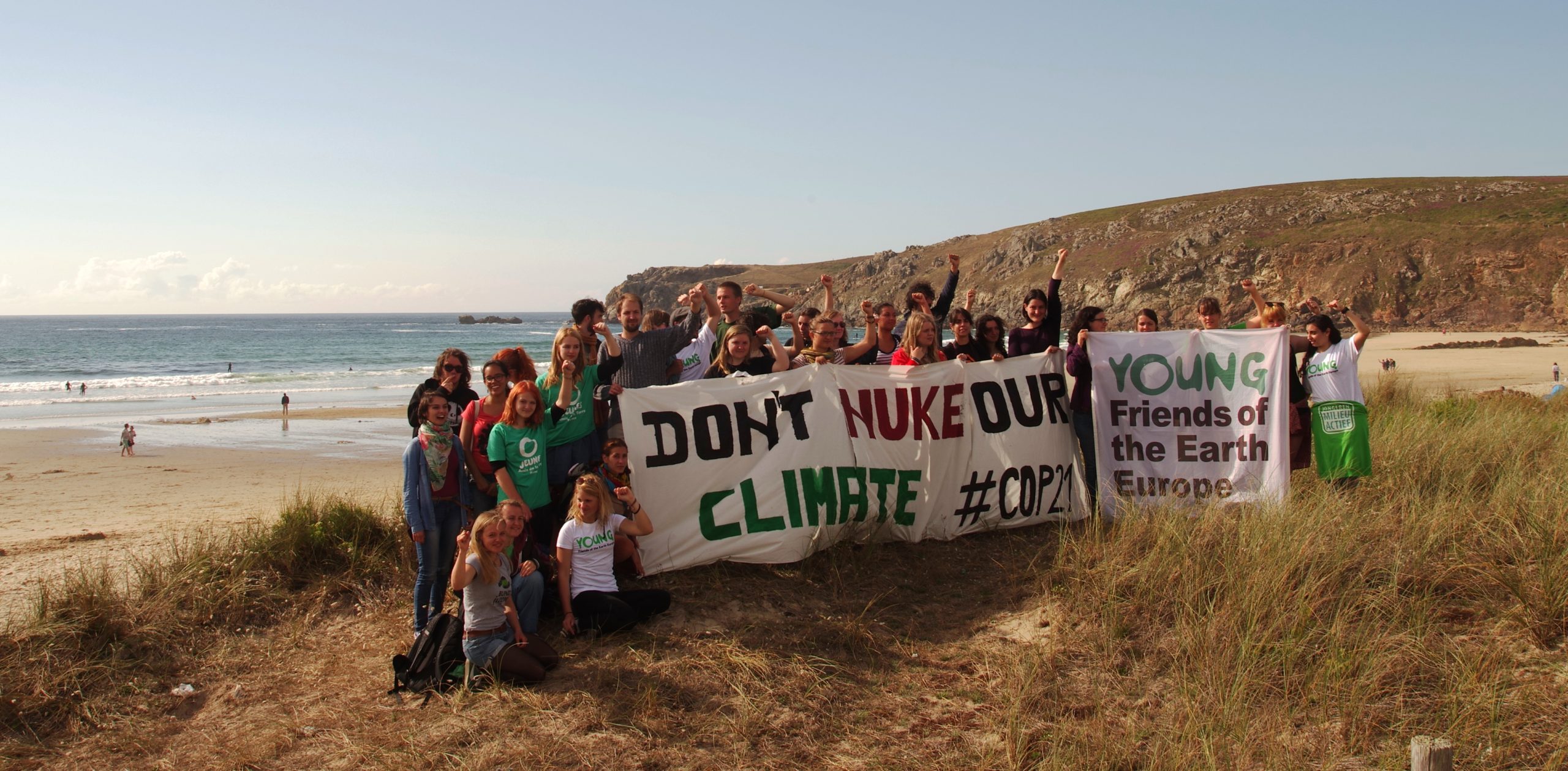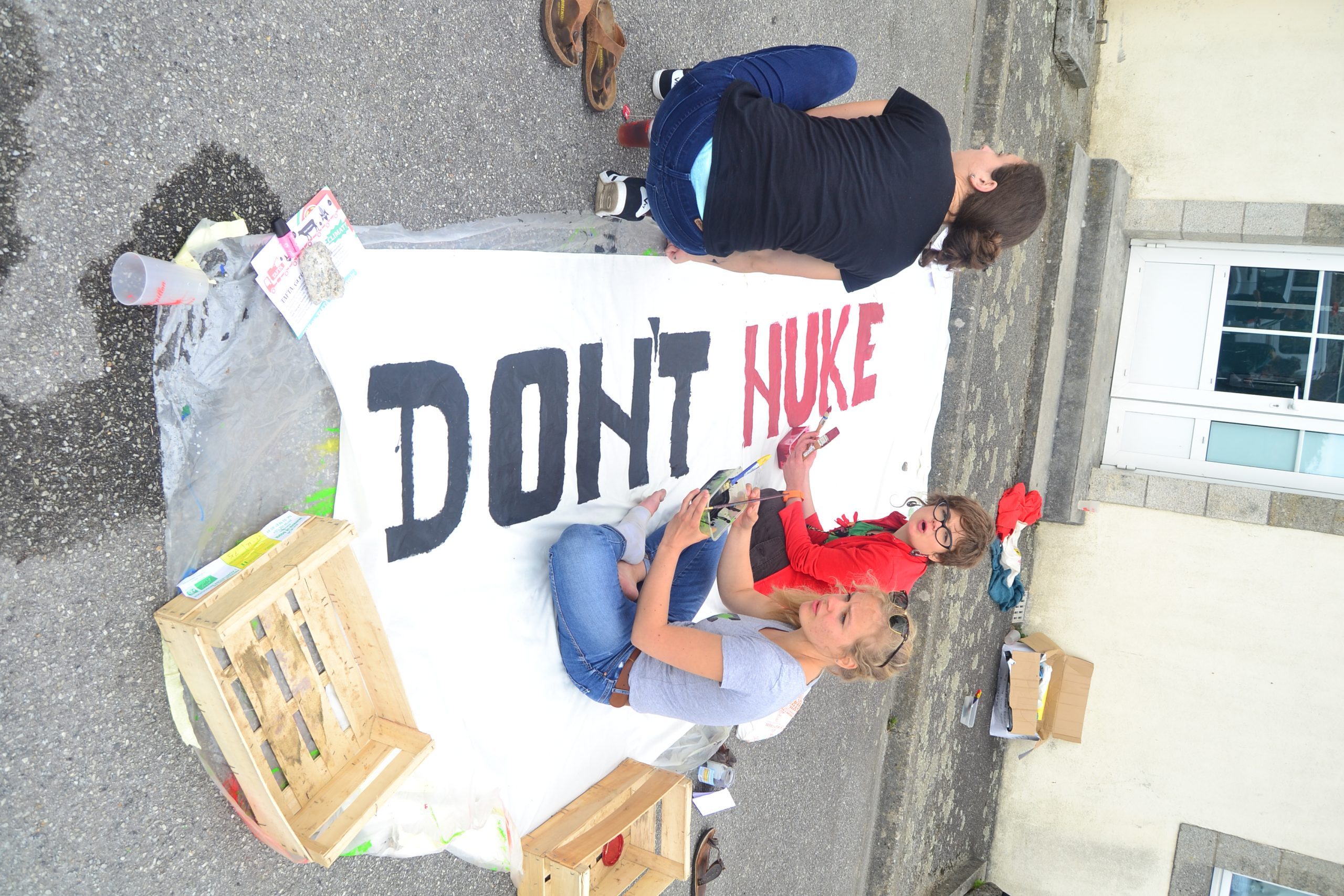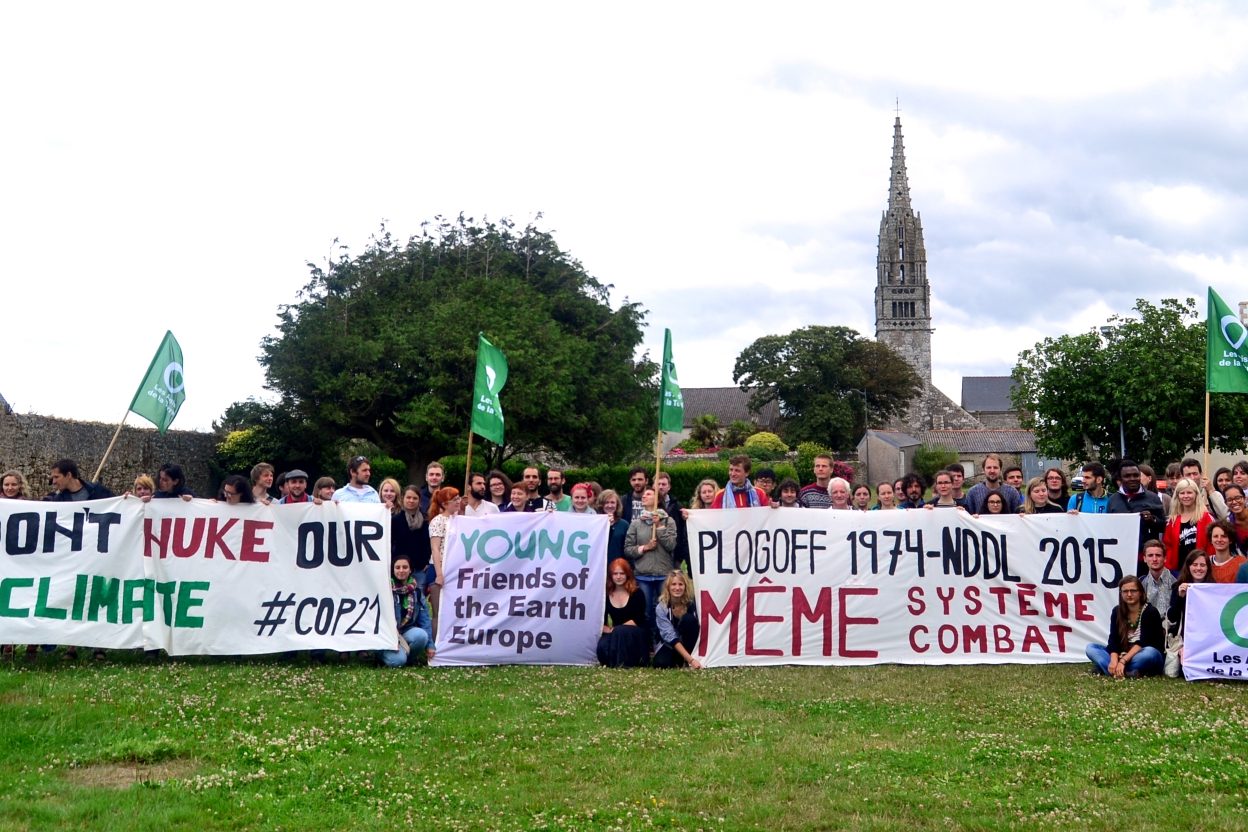In the afternoon on day 2, we squeezed in a hike around a historic site of anti-nuclear activism on the coast, accompanied by the same activists who scuppered plans for a nuclear power plant in the 1970s.
Dora from Croatia: After 2 days of spending the majority of our time sitting and exercising our brains and vocal chords, we got to stretch our legs and go on a two-hour hike to a historical place. Historical from our perspective, at least. Starting at the town of Plogoff, where 30 years ago a local Breton community singlehandedly stopped the construction of a nuclear power plant, the hike took us to the actual place where the darned thing was planned to be built. It was a very weird sight. I couldn’t ever imagine such a destructive thing being built in such a peaceful place. We were surrounded only by the wind, the rocks and the immense horizon of the Atlantic. We sat there, in silence for a bit, shutting our minds and simply enjoying the untouched nature. We continued the hike and ended up at the beach where the 500,000-strong victory celebrations happened in 1980. We unfurled our banners and remembered, as activists, our past victories that should definitely motivate us for the future. The pictures were great, although fitting a 100 people in a single frame was quite a job. What a day!

As Clemence from France explains, the struggle is hugely symbolic within France, and the climate fight against nuclear and the system that produces it is as relevant today as it was 30 years ago.
For people who do not live on the frontlines, environmental and social issues – and climate change especially – often feel like distant, invisible problems that don’t directly affect us. These struggles are only visible to us when resistance and conflicts arise, led by communities who pay the highest costs of extractivism, pollution and environmental destruction.
Our hike around where the nuclear power plant in Plogoff would have been sited
The Anti-nuclear Resistance in Plogoff
In the seventies, following the first oil crisis in 1973, the French government pursued a very aggressive policy of mass installation of nuclear power plants all over the country. They planned to build 200 plants, an enormous number that would have by far outreached actual energy demand.
One of the sites chosen was Plogoff, a small town in the region of Britanny in the west of France. For seven years, the local population resisted the project. Strikes, mass mobilisations of 100 000 people, shut-downs, barricades, and police repression… Little by little, through the determination of the people, the issue gained momentum and achieved national coverage. In 1981, the newly elected president François Mitterrand backed down, and the project was cancelled. The resistance was so effective that to this day, Britanny is the only region in France without nuclear power plants.
Plogoff is one of the reasons we chose the location of the annual Young Friends of the Earth Europe Summer Camp. Our first concern when reflecting on the location of the event was rooting the project in local struggles. We had the honour of meeting the leaders of the movement. We met with Jean Moualic, one of the historic leaders of the movement, and Nicole and Félix Le Garrec, who made a documentary about the mobilisation. At the time, the couple mortgaged their house to finance the film. For us it has been truly and profoundly inspiring to listen to the stories of resistance and get a feel of the strength and determination of local communities fighting harmful projects.
Documentary: Plogoff:stones againt guns
COP21: the Nuclear COP
Close to 80% of France’s electricity comes from nuclear power. We are the country the most dependent of this energy in the world. Today, with the urgency to reduce carbon emissions and keep more than the two third of the world fossil fuel reserves under the ground, big corporations and countries are attempting to present nuclear as a solution to climate change. The COP19 in Warsaw in 2013 was a coal COP, with powerful corporate interests hijacking the UN climate change negotiations. Today, we can already expect the COP21 in Paris 2015 to be a nuclear COP.
When he was elected in 2012, socialist president François Hollande promised ambitious environmental action, and in the wake of the disaster of Fukushima, promised to strongly reduce France’s dependence on nuclear energy to 50% by 2025. Since his election, his policies have been disappointing on every level.
To get an idea of Hollande’s double dealings, France actively lobbied the European Commission to prevent a more ambitious renewable energy target for 2030, bending to corporate interest. France’s transition law was also heavily influenced by the nuclear lobby, with last minutes arrangements being made with the representatives of the industry behind closed doors. Last but not least, EDF, a state-owned corporation, which put in motion the nuclearisation of France since the 1970s is among the sponsors of the Paris 2015 Climate Conference.

Nuclear is a Dirty Energy
Nuclear is far from being the “clean” energy we need to win the climate struggle. Nuclear is a dirty energy from start to finish. It deeply pollutes the environment, puts high risks on our future, and causes huge human rights violations.
Uranium-rich countries pay a huge toll for France’s dependency on nuclear. The extraction of uranium has immeasurable human and ecological costs. While having the largest world reserves of uranium, Niger is one of the poorest countries in the world, with 60% of the population living below the poverty line. France gets 30% of its uranium from the country – but AREVA, a partly state-owned French company, pays very low royalties for the mineral. Beyond not benefitting the population of these countries, the control of uranium reserves by France leads to social conflicts and even military intervention. France’s intervention in the conflict in Mali has been denounced as an attempt to maintain its control of African uranium reserves. France actually regularly sends special forces to protect the mines run by the energy company AREVA.
Beyond human rights violations and the control of natural resources of nations from the Global South, nuclear cannot be a solution to climate change. Nuclear waste pollutes our planet’s soils and water sources for millennia, and presents constant risk of catastrophic incidents. The industry also emits carbon at every stage of the chain of production, from uranium mines, to transport, to power plants themselves. Nuclear requires a centralised energy system, with very low flexibility when energy demand fluctuates – and so it does require coal power plants to complete the demand at peak consumption times.
Yesterday our elders resisted the first push of nuclear energy by the French state.
Today the fight continues, here and elsewhere, for global justice.
Postscript: The day after the action, Les Jeunes Amis de la Terre/Young Friends of the Earth France and Young Friends of the Earth Europe received a very moving letter thanking us for sharing the memories of the struggle against nuclear. Their letter can be found English and in French, and our response is online here.
